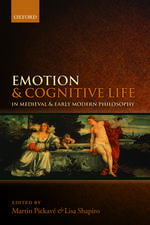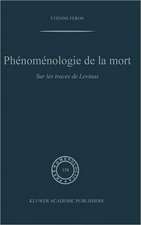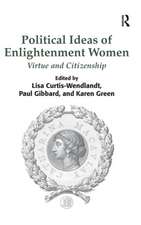Virtue Ethics for Women 1250-1500: The New Synthese Historical Library, cartea 69
Editat de Karen Green, Constant Mewsen Limba Engleză Paperback – 29 mai 2013
Virtue Ethics for Women 1250-1500 will be of interest to those studying virtue ethics, the history of women's ideas and Medieval and Renaissance thought in general.
| Toate formatele și edițiile | Preț | Express |
|---|---|---|
| Paperback (1) | 638.43 lei 6-8 săpt. | |
| SPRINGER NETHERLANDS – 29 mai 2013 | 638.43 lei 6-8 săpt. | |
| Hardback (1) | 643.99 lei 6-8 săpt. | |
| SPRINGER NETHERLANDS – 7 apr 2011 | 643.99 lei 6-8 săpt. |
Din seria The New Synthese Historical Library
- 18%
 Preț: 950.52 lei
Preț: 950.52 lei - 18%
 Preț: 949.73 lei
Preț: 949.73 lei - 18%
 Preț: 946.24 lei
Preț: 946.24 lei - 18%
 Preț: 953.82 lei
Preț: 953.82 lei - 20%
 Preț: 1618.07 lei
Preț: 1618.07 lei - 15%
 Preț: 643.00 lei
Preț: 643.00 lei - 18%
 Preț: 955.56 lei
Preț: 955.56 lei - 15%
 Preț: 644.82 lei
Preț: 644.82 lei - 18%
 Preț: 1387.55 lei
Preț: 1387.55 lei - 18%
 Preț: 955.56 lei
Preț: 955.56 lei - 18%
 Preț: 951.47 lei
Preț: 951.47 lei - 15%
 Preț: 637.46 lei
Preț: 637.46 lei - 15%
 Preț: 644.63 lei
Preț: 644.63 lei - 18%
 Preț: 947.32 lei
Preț: 947.32 lei - 15%
 Preț: 644.49 lei
Preț: 644.49 lei - 15%
 Preț: 645.47 lei
Preț: 645.47 lei - 18%
 Preț: 953.82 lei
Preț: 953.82 lei - 18%
 Preț: 958.38 lei
Preț: 958.38 lei - 15%
 Preț: 639.25 lei
Preț: 639.25 lei - 15%
 Preț: 638.89 lei
Preț: 638.89 lei - 18%
 Preț: 953.65 lei
Preț: 953.65 lei - 18%
 Preț: 952.26 lei
Preț: 952.26 lei - 18%
 Preț: 950.52 lei
Preț: 950.52 lei - 18%
 Preț: 1225.28 lei
Preț: 1225.28 lei - 15%
 Preț: 646.11 lei
Preț: 646.11 lei
Preț: 638.43 lei
Preț vechi: 751.10 lei
-15% Nou
Puncte Express: 958
Preț estimativ în valută:
122.17€ • 130.64$ • 101.86£
122.17€ • 130.64$ • 101.86£
Carte tipărită la comandă
Livrare economică 17 aprilie-01 mai
Preluare comenzi: 021 569.72.76
Specificații
ISBN-13: 9789400735828
ISBN-10: 9400735820
Pagini: 256
Ilustrații: XXXII, 224 p.
Dimensiuni: 155 x 235 x 13 mm
Greutate: 0.36 kg
Ediția:2011
Editura: SPRINGER NETHERLANDS
Colecția Springer
Seria The New Synthese Historical Library
Locul publicării:Dordrecht, Netherlands
ISBN-10: 9400735820
Pagini: 256
Ilustrații: XXXII, 224 p.
Dimensiuni: 155 x 235 x 13 mm
Greutate: 0.36 kg
Ediția:2011
Editura: SPRINGER NETHERLANDS
Colecția Springer
Seria The New Synthese Historical Library
Locul publicării:Dordrecht, Netherlands
Public țintă
ResearchCuprins
List of Illustrations.- Acknowledgements.- Notes on contributors.- Abbreviations. Introduction.- 1. Does Virtue Recognise Gender? Christine de Pizan’s City of Ladies in the Light of Scholastic Debate; István P. Bejczy.- 2. The Speculum dominarum (Miroir des dames) and Transformations of the Literature of Instruction for Women in the Early Fourteenth Century; Constant J. Mews.- 3. A Mirror of Queenship: The Speculum dominarum and the Demands of Justice; Rina Lahav.- 4. A Lady’s Guide to Salvation: the Miroir des dames Compilation; Janice Pinder.- 5. Charles V’s Visual Definition of the Queen’s Virtues; Cécile Quentel-Touche.- 6. Jean Gerson’s Writings to his Sisters and Christine de Pizan’s Livre des trois vertus: an Intellectual Dialogue Culminating in Friendship; Earl Jeffrey Richards.- 7. From Le Miroir des dames to Le Livre des trois vertus; Karen Green.- 8. Appearing Virtuous: Christine de Pizan’s Le Livre des trois vertus and Anne de France’s Les Enseignements d’Anne de France; Tracy Adams.- 9. Weaving Virtue: Laura Cereta as a New Penelope; Natasha Amendola.- 10. Margherita Cantelmo and the Worth of Women in Renaissance Italy; Carolyn James.- 11. Like Mother Like Daughter: Moral and Literary Virtues in French Renaissance Women’s Writings; Catherine Müller.- 12. Joanna of Castile’s Entry into Brussels: Viragos, Wise and Virtuous Women; Anne-Marie Legaré.- Bibliography.- Index of manuscripts cited.- General index.
Notă biografică
Karen Green is a philosopher and the author of many articles in philosophy and the history of women's ideas, including The Woman of Reason (1995) and with Jacqueline Broad, A History of Women's Political Thought in Europe, 1400-1700 (2009).
Constant J. Mews is a medievalist and specialist in the ideas of Abelard and Eloise. He has published many works including Abelard, and The Lost Love Letters of Abelard and Eloise. Together they published Healing the Body Politic: the political thought of Christine de Pizan (2005). Jointly with Janice Pinder their translation of Christine de Pizan’s Livre de Paix won the MLA Aldo and Jeanne Scaglione Prize for an Outstanding Translation of a Scholarly Study of Literature in 2009.
Constant J. Mews is a medievalist and specialist in the ideas of Abelard and Eloise. He has published many works including Abelard, and The Lost Love Letters of Abelard and Eloise. Together they published Healing the Body Politic: the political thought of Christine de Pizan (2005). Jointly with Janice Pinder their translation of Christine de Pizan’s Livre de Paix won the MLA Aldo and Jeanne Scaglione Prize for an Outstanding Translation of a Scholarly Study of Literature in 2009.
Textul de pe ultima copertă
This book locates Christine de Pizan's argument that women are virtuous members of the political community within the context of earlier discussions of the relative virtues of men and women. It is the first to explore how women were represented and addressed within medieval discussions of the virtues. It introduces readers to the little studied Speculum Dominarum (Mirror of Ladies), a mirror for a princess, compiled for Jeanne of Navarre, which circulated in the courtly milieu that nurtured Christine. Throwing new light on the way in which Medieval women understood the virtues, and were represented by others as virtuous subjects, it positions the ethical ideas of Anne of France, Laura Cereta, Marguerite of Navarre and the Dames de la Roche within an evolving discourse on the virtues that is marked by the transition from Medieval to Renaissance thought.
Virtue Ethics for Women 1250-1500 will be of interest to those studying virtue ethics, the history of women's ideas and Medieval and Renaissance thought in general.
Virtue Ethics for Women 1250-1500 will be of interest to those studying virtue ethics, the history of women's ideas and Medieval and Renaissance thought in general.
Caracteristici
First study to consider medieval virtue ethics from the perspective of gender First publication to discuss the little studied "Mirror of Ladies", widely copied in the fourteenth and fifteenth centuries First study to situate Christine de Pizan and later women writers within a tradition of ethical concern going back to the late thirteenth century






















